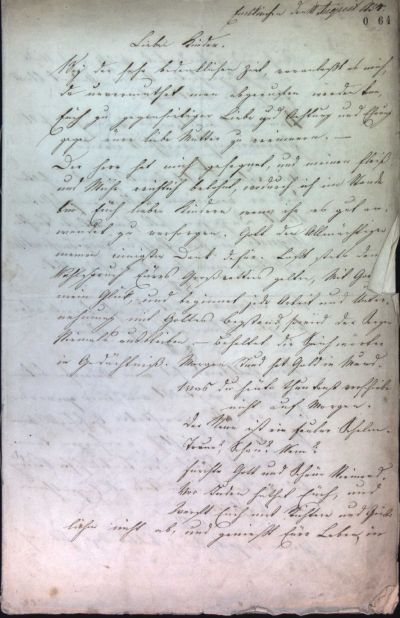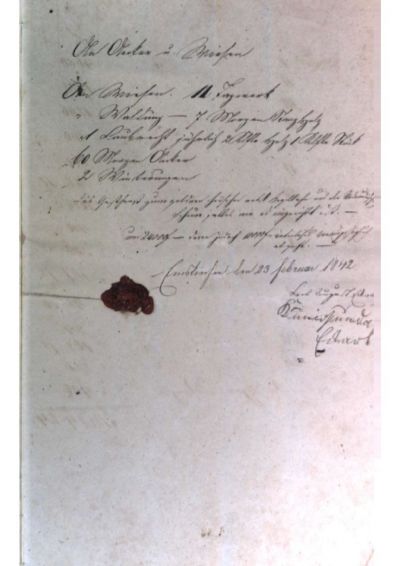Testamente von Carl August Eckart/en: Unterschied zwischen den Versionen
(Die Seite wurde neu angelegt: „400px|thumb|right|The will drawn up by Carl August, the "Napoleon of Emskirchen", in 1854.The…“) |
(Die Seite wurde neu angelegt: „''"Dear children. The very disturbing time leads me, as one can be called to one’s maker unexpectedly, to remind you to love and respect one another and to h…“) |
||
| Zeile 4: | Zeile 4: | ||
[[Datei:FA-S464_Testament_des_Carl_August_E._vom_18.08.1854.jpg|400px|thumb|right|The will drawn up by Carl August, the "Napoleon of Emskirchen", in 1854.]]The [[Archiv der Familie Eckart/en|Eckart Family Archive]] contains two wills by [[Carl August Eckart (VI 18)/en|Carl August Eckart]], dating from the years 1842 and 1854. Both documents consist of several pages and were sealed with waxen seals and the [[Das Wappen der Familie Eckart/en|Eckart family’s coat of arms]]. They are thus among the earliest documents to have been passed down to us on which the coat of arms is used. The will starts with the words: | [[Datei:FA-S464_Testament_des_Carl_August_E._vom_18.08.1854.jpg|400px|thumb|right|The will drawn up by Carl August, the "Napoleon of Emskirchen", in 1854.]]The [[Archiv der Familie Eckart/en|Eckart Family Archive]] contains two wills by [[Carl August Eckart (VI 18)/en|Carl August Eckart]], dating from the years 1842 and 1854. Both documents consist of several pages and were sealed with waxen seals and the [[Das Wappen der Familie Eckart/en|Eckart family’s coat of arms]]. They are thus among the earliest documents to have been passed down to us on which the coat of arms is used. The will starts with the words: | ||
'' | ''"Dear children. The very disturbing time leads me, as one can be called to one’s maker unexpectedly, to remind you to love and respect one another and to honor your dear mother. The Lord has blessed me and amply rewarded my diligence and effort, so that I am able to provide for you, dear children, if you use it to good effect. My sincerest thanks to God the Almighty for this. Always follow your grandfather’s motto ›With God! My happiness! ‹ and start any work and any undertaking with God’s help, and his blessing will never be long in coming."''<ref>Eckart Family Archive, FA-S450, will of February 23, 1842, by Carl August Eckart and Kunigunde Eckart, née Galster, with inventory, and FA-S464, will of August 18, 1854, by Carl August Eckart.</ref> | ||
„Sehr bedenklich“ und „unvermuthet“ war für Carl August vermutlich der plötzliche Tod seiner beiden Brüder [[David Eckart (VI 17)|David Eckart]] im März 1853 und [[Georg Eckart (VI 14)|Georg Eckart]] im Januar 1854 gewesen. Er selbst starb drei Jahre später, kurz vor seinem 70. Geburtstag, am 16. November 1857. Sein Grab ist noch heute auf dem Friedhof von Emskirchen zu besichtigen. <ref>Otto Eckart, Michael Kamp: Die Geschichte der Familie Eckart. Von Franken nach München und Hawaii. München 2015, S. 111, 117.</ref> | „Sehr bedenklich“ und „unvermuthet“ war für Carl August vermutlich der plötzliche Tod seiner beiden Brüder [[David Eckart (VI 17)|David Eckart]] im März 1853 und [[Georg Eckart (VI 14)|Georg Eckart]] im Januar 1854 gewesen. Er selbst starb drei Jahre später, kurz vor seinem 70. Geburtstag, am 16. November 1857. Sein Grab ist noch heute auf dem Friedhof von Emskirchen zu besichtigen. <ref>Otto Eckart, Michael Kamp: Die Geschichte der Familie Eckart. Von Franken nach München und Hawaii. München 2015, S. 111, 117.</ref> | ||
Version vom 19. August 2021, 20:45 Uhr
The Eckart Family Archive contains two wills by Carl August Eckart, dating from the years 1842 and 1854. Both documents consist of several pages and were sealed with waxen seals and the Eckart family’s coat of arms. They are thus among the earliest documents to have been passed down to us on which the coat of arms is used. The will starts with the words:
"Dear children. The very disturbing time leads me, as one can be called to one’s maker unexpectedly, to remind you to love and respect one another and to honor your dear mother. The Lord has blessed me and amply rewarded my diligence and effort, so that I am able to provide for you, dear children, if you use it to good effect. My sincerest thanks to God the Almighty for this. Always follow your grandfather’s motto ›With God! My happiness! ‹ and start any work and any undertaking with God’s help, and his blessing will never be long in coming."[1]
„Sehr bedenklich“ und „unvermuthet“ war für Carl August vermutlich der plötzliche Tod seiner beiden Brüder David Eckart im März 1853 und Georg Eckart im Januar 1854 gewesen. Er selbst starb drei Jahre später, kurz vor seinem 70. Geburtstag, am 16. November 1857. Sein Grab ist noch heute auf dem Friedhof von Emskirchen zu besichtigen. [2]
Einzelnachweise
- ↑ Eckart Family Archive, FA-S450, will of February 23, 1842, by Carl August Eckart and Kunigunde Eckart, née Galster, with inventory, and FA-S464, will of August 18, 1854, by Carl August Eckart.
- ↑ Otto Eckart, Michael Kamp: Die Geschichte der Familie Eckart. Von Franken nach München und Hawaii. München 2015, S. 111, 117.

